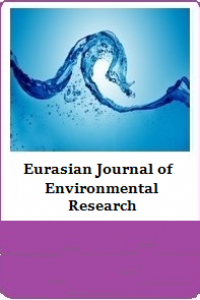Öz
Kaynakça
- Reference 1. Baştürk A., Öztürk M., Demir A. & Kanat G. 2003 Kömürcüoda (Asya Yakası) Katı Atık Dolgu Alanı Çevresel Etki Değerlendirmesi (ÇED) Ön Araştırma Raporu (Environmental Impact Assessment (EIA) of Solid Waste Landfill in Kömürcüoda (Asian Side) Preliminary Survey Report). Yildiz Technical University, İstanbul.
- Reference 2. Bou-Zeid E. & Ei-Fadel M. 2004. Parametric Sensitivity Analysis of Leachate Transport Simulations at Landfills. Waste Management, 24 (7), 681–689.
- Reference 3. Cansız V. 2011. The Removal of Microbial Activities and Metal Ions in the Clayey Soil with Adsorption Technique. Master thesis, Institute of Graduate Studies in Science and Engineering, Istanbul University.
- Reference 4. Christensen T.H. & Kjeldsen P. 1991 Basic biochemical processes in landfills. in: Sanitary Landfilling: Process, Technology and Environmental Impact, Academic Press. TH., Christensen, R., Stegmann, R. Cossu, (eds.), London, pp. 251–256.
- Reference 5. Greenberg A. 2005. Standart Methods for the Examiniation of Water and Wastewater, American Public Health Association, Washington, USA.
- Reference 6. Hamdi N. & Srasra E. 2013. Hydraulic Conductivity Study of Compacted Clay Soils Used as Landfill Liners for an Acidic Waste. Waste Management, 33, 60–66.
- Reference 7. Janardanan O., Stephenson R.W. & Asce M. 1989. Permeability of Clays Under Organic Permeants. Journal of Geotechnicial Engineering, 115 (1), 23121.
- Reference 8. Moravia W.G. & Amaral M.C.S., Lange L.C..2013. Evaluation of Landfill Leachate Treatment by Advanced Oxidative Process by Fenton's Reagent Combined with Membrane Separation System. Waste Management, 33, pp. 89–101.
- Reference 9. Sertdemir N.B. 2010. Sıkıştırılmış Killi Zeminlerde Permeabilite-Giderim İlişkisinin Kimyasal ve Biyolojik Parametreler Açısından İncelenmesi (Investigation of Permeability-Removal Relationship in Compacted Clayey Soils in Terms of Chemical and Biological Parameters). Master thesis, Institute of Graduate Studies in Science and Engineering, Istanbul University.
- Reference 10. Shashikumar B.M. 1992. Effect of Leachate on the Stability of Landfill Composite Liners. Master thesis, Ohio University.
- Reference 11. Xue Q., Li J.-S. & Liu L. 2013. Experimental Study on Anti-Seepage Grout Made of Leachate Contaminated Clay in Landfill. Applied Clay Science, 80–81, 438–442.
- Reference 12. Yao, P. 2017. Perspectives on Technology for Landfill Leachate Treatment. King Saud University Arabian Journal of Chemistry, 10 (2).
Öz
Solid waste landfills
constitute a potential major threat to
groundwater quality. Water present in the waste,
rainwater infiltration during and/or after the landfilling process and
groundwater penetration can result in the generation of leachate. Leachate is a
kind of waste liquid consisting of waste contaminants. Clay soils are natural
matters to minimize the permeability of natural soil liners in landfill areas. Some
contaminants in the leachate can alter compacted clay soils and cause
increasing or decreasing permeability.
This study investigates effects of leachate on the permeability of the compacted and consolidated
clay soils, thereby evaluating the effectiveness
of these clay soils as liners in preventing groundwater contamination. To
determine removal capability of compacted and consolidated clay soils, some
metal ions (Fe(II), Mn(II)) are also measured in influent and effluent of the
lab-scale reactor.
According to
results of this study, Fe(II) and Mn(II) removal efficiency increases with
time. Fe(OH)3 and MnO2 precipitations on the clay soil
particles increase oxidation rate depending on the autocatalytic effect. Also, in the beginning,
some decrease has been observed in the compacted and consolidated clay soils
permeability associated with the contamination. However, as time goes by, these
results show that leachates may cause an increase
in the permeability.
Anahtar Kelimeler
Kaynakça
- Reference 1. Baştürk A., Öztürk M., Demir A. & Kanat G. 2003 Kömürcüoda (Asya Yakası) Katı Atık Dolgu Alanı Çevresel Etki Değerlendirmesi (ÇED) Ön Araştırma Raporu (Environmental Impact Assessment (EIA) of Solid Waste Landfill in Kömürcüoda (Asian Side) Preliminary Survey Report). Yildiz Technical University, İstanbul.
- Reference 2. Bou-Zeid E. & Ei-Fadel M. 2004. Parametric Sensitivity Analysis of Leachate Transport Simulations at Landfills. Waste Management, 24 (7), 681–689.
- Reference 3. Cansız V. 2011. The Removal of Microbial Activities and Metal Ions in the Clayey Soil with Adsorption Technique. Master thesis, Institute of Graduate Studies in Science and Engineering, Istanbul University.
- Reference 4. Christensen T.H. & Kjeldsen P. 1991 Basic biochemical processes in landfills. in: Sanitary Landfilling: Process, Technology and Environmental Impact, Academic Press. TH., Christensen, R., Stegmann, R. Cossu, (eds.), London, pp. 251–256.
- Reference 5. Greenberg A. 2005. Standart Methods for the Examiniation of Water and Wastewater, American Public Health Association, Washington, USA.
- Reference 6. Hamdi N. & Srasra E. 2013. Hydraulic Conductivity Study of Compacted Clay Soils Used as Landfill Liners for an Acidic Waste. Waste Management, 33, 60–66.
- Reference 7. Janardanan O., Stephenson R.W. & Asce M. 1989. Permeability of Clays Under Organic Permeants. Journal of Geotechnicial Engineering, 115 (1), 23121.
- Reference 8. Moravia W.G. & Amaral M.C.S., Lange L.C..2013. Evaluation of Landfill Leachate Treatment by Advanced Oxidative Process by Fenton's Reagent Combined with Membrane Separation System. Waste Management, 33, pp. 89–101.
- Reference 9. Sertdemir N.B. 2010. Sıkıştırılmış Killi Zeminlerde Permeabilite-Giderim İlişkisinin Kimyasal ve Biyolojik Parametreler Açısından İncelenmesi (Investigation of Permeability-Removal Relationship in Compacted Clayey Soils in Terms of Chemical and Biological Parameters). Master thesis, Institute of Graduate Studies in Science and Engineering, Istanbul University.
- Reference 10. Shashikumar B.M. 1992. Effect of Leachate on the Stability of Landfill Composite Liners. Master thesis, Ohio University.
- Reference 11. Xue Q., Li J.-S. & Liu L. 2013. Experimental Study on Anti-Seepage Grout Made of Leachate Contaminated Clay in Landfill. Applied Clay Science, 80–81, 438–442.
- Reference 12. Yao, P. 2017. Perspectives on Technology for Landfill Leachate Treatment. King Saud University Arabian Journal of Chemistry, 10 (2).
Ayrıntılar
| Bölüm | Articles |
|---|---|
| Yazarlar | |
| Yayımlanma Tarihi | 1 Ağustos 2017 |
| Gönderilme Tarihi | 20 Temmuz 2017 |
| Yayımlandığı Sayı | Yıl 2017 Cilt: 1 Sayı: 1 |
Kaynak Göster
Creative Commons License
Attribution-NonCommercial-ShareAlike 4.0 International (CC BY-NC-SA 4.0)

Creative Commons Attribution-NonCommercial-ShareAlike (CC BY-NC-SA) License lets others remix, tweak, and build upon the work non-commercially, as long as they credit the author(s) and license their new creations under the identical terms.


